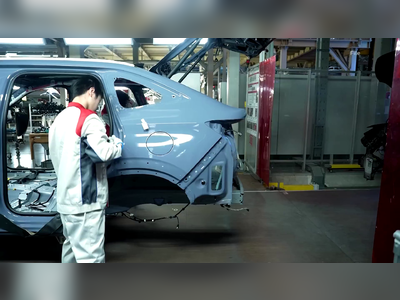Meta Platforms Advances Automation in Advertising
Company plans for fully automated ad creation by 2026 using artificial intelligence.
Meta Platforms has announced a significant shift towards automation, aiming to eliminate the need for human workers in advertising.
Following its decision to deploy algorithms for content moderation and artificial intelligence for platform management, the company intends to fully automate its advertising processes by 2026. According to CEO Mark Zuckerberg, the vision is to have businesses communicate their advertising needs—essentially telling Meta what product they wish to sell, how much they are willing to spend, and then letting Meta's systems handle the rest automatically.
Zuckerberg elaborated at a recent shareholder meeting, stating, "We want to get to a situation where any company simply tells us what they want—to sell a product or attract new customers—how much they are willing to pay for the result, links their account to our system, and we will do the rest automatically." This approach indicates that Meta is positioning itself as a fully automated revenue-generating machine, reducing the need for human resources in its advertising initiatives.
The upcoming technology will allow artificial intelligence to autonomously create advertising campaigns.
Companies will only need to provide a product image and specify their budget, after which AI will generate complete campaigns, including visuals, copywriting, video production, audience targeting, and budget allocation, all without the involvement of marketing professionals.
Meta is not alone in this trend towards advertising automation.
Google has recently launched a new tool called Veo, which creates videos from text and is anticipated to become part of future marketing solutions.
Additionally, companies such as OpenAI and Midjourney are already being utilized to generate advertising content, while Meta is exploring the integration of these tools into its systems.
In addition, Meta is introducing advanced personalization into its advertisements.
The same advertisement may appear differently based on the user’s location; for instance, users in snowy regions might see a car driving on a mountain road, while urban dwellers would view the same vehicle in an urban landscape.
AI will adjust the content of advertisements in real-time according to user data.
This strategy could potentially reshape advertising for over 3.4 billion users across Facebook, Instagram, and other platforms owned by Meta.
This is particularly noteworthy as advertising constitutes approximately 97% of Meta's revenue, which stood at $134.9 billion in 2023. Small and medium-sized enterprises are expected to benefit the most from this shift, as they may not have the budgets to hire creative professionals.
Instead of paying for creatives, copywriters, and marketing experts, they will only need to submit a product image and allow AI to manage the rest.
Following its decision to deploy algorithms for content moderation and artificial intelligence for platform management, the company intends to fully automate its advertising processes by 2026. According to CEO Mark Zuckerberg, the vision is to have businesses communicate their advertising needs—essentially telling Meta what product they wish to sell, how much they are willing to spend, and then letting Meta's systems handle the rest automatically.
Zuckerberg elaborated at a recent shareholder meeting, stating, "We want to get to a situation where any company simply tells us what they want—to sell a product or attract new customers—how much they are willing to pay for the result, links their account to our system, and we will do the rest automatically." This approach indicates that Meta is positioning itself as a fully automated revenue-generating machine, reducing the need for human resources in its advertising initiatives.
The upcoming technology will allow artificial intelligence to autonomously create advertising campaigns.
Companies will only need to provide a product image and specify their budget, after which AI will generate complete campaigns, including visuals, copywriting, video production, audience targeting, and budget allocation, all without the involvement of marketing professionals.
Meta is not alone in this trend towards advertising automation.
Google has recently launched a new tool called Veo, which creates videos from text and is anticipated to become part of future marketing solutions.
Additionally, companies such as OpenAI and Midjourney are already being utilized to generate advertising content, while Meta is exploring the integration of these tools into its systems.
In addition, Meta is introducing advanced personalization into its advertisements.
The same advertisement may appear differently based on the user’s location; for instance, users in snowy regions might see a car driving on a mountain road, while urban dwellers would view the same vehicle in an urban landscape.
AI will adjust the content of advertisements in real-time according to user data.
This strategy could potentially reshape advertising for over 3.4 billion users across Facebook, Instagram, and other platforms owned by Meta.
This is particularly noteworthy as advertising constitutes approximately 97% of Meta's revenue, which stood at $134.9 billion in 2023. Small and medium-sized enterprises are expected to benefit the most from this shift, as they may not have the budgets to hire creative professionals.
Instead of paying for creatives, copywriters, and marketing experts, they will only need to submit a product image and allow AI to manage the rest.
AI Disclaimer: An advanced artificial intelligence (AI) system generated the content of this page on its own. This innovative technology conducts extensive research from a variety of reliable sources, performs rigorous fact-checking and verification, cleans up and balances biased or manipulated content, and presents a minimal factual summary that is just enough yet essential for you to function as an informed and educated citizen. Please keep in mind, however, that this system is an evolving technology, and as a result, the article may contain accidental inaccuracies or errors. We urge you to help us improve our site by reporting any inaccuracies you find using the "Contact Us" link at the bottom of this page. Your helpful feedback helps us improve our system and deliver more precise content. When you find an article of interest here, please look for the full and extensive coverage of this topic in traditional news sources, as they are written by professional journalists that we try to support, not replace. We appreciate your understanding and assistance.










